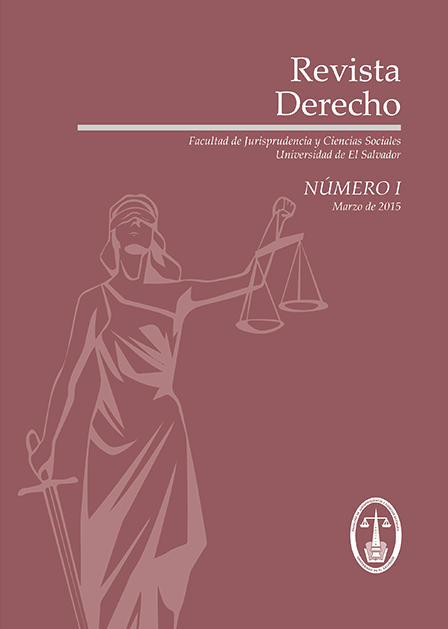The Influence of Decisions by the Inter-American Court of Human Rights and the Inter-American Commission on Human Rights on the Criminal Law of Member States
Report on El Salvador
Keywords:
Inter-American Court of Human Rights, Inter-American Commission of Human Rights, jurisprudence, El Salvador, Compliance of condamnatory sentenceAbstract
El Salvador is one of the few countries in Latin America proclaiming explicitly in its Constitution, the existence and validity of an international legal system with supra legal hierarchy. Since 1978, it is part of the American Convention on Human Rights (ACHR) and in 1995, it recognized the litigious competition of the Inter-American Court of Human Rights (IACHR). However, three of the first four condemnatory sentences - existing until December 2012 - of this Court against this country, they have not been fulfilled regard as the dispositive part in continue ordering or restart the respective criminal proceedings and exceed the limitations or obstacles of fact and law that prevent the compliance investigations effectively. This study is about these and others phenomena, while presents an overview of the influence of the resolutions of the Inter-American Court (IAC) in criminal law and criminal procedure of El Salvador, and analyzed whether the decisions of these bodies are fulfilled in the internal field and in what extent they are. It is divided into six parts that are developed, among other topics, the most relevant aspects of the incorporation of international law, especially of the ACHR, domestically, including recognition and hierarchy of international treaties in the Salvadoran legal system; direct application of the ACHR and recognition in the domestic law of the state obligation to comply with the decisions of the Inter-American Commission on Human Rights (IACHR).
Downloads
References
Corte Interamericana de Derechos Humanos. Caso 19 Comerciantes, supra nota 15, párr. 175
Corte Interamericana de Derechos Humanos. Caso 19 Comerciantes, supra nota 15, párr. 262.
Corte Interamericana de Derechos Humanos. Caso Carpio Nicolle y otros, supra nota 3, párr.130;
Corte Interamericana de Derechos Humanos. Caso Contreras y otros vs. El Salvador. Sentencia del 31 de agosto de 2011 (Fondo, Reparaciones y Costas). http://www.corteidh.or.cr/casos.cfm
Corte Interamericana de Derechos Humanos. Caso de las Hermanas Serrano Cruz vs. El Salvador Sentencia del 1 de marzo de 2005. http://www.corteidh.or.cr/casos.cfm
Corte Interamericana de Derechos Humanos. Caso de los Hermanos Gómez Paquiyauri, supra nota 10, párr. 148
Corte Interamericana de Derechos Humanos. Caso García Prieto y otros vs. El Salvador. Sentencia del 20 de noviembre de 2007 (Excepciones Preliminares, Fondo, Reparaciones y Costas). http://www.corteidh.or.cr/casos.cfm
Corte Interamericana de Derechos Humanos. Caso Maritza Urrutia, supra nota 19, párr. 126.
Corte Interamericana de Derechos Humanos. Caso Myrna Mack Chang, supra nota 8, párr. 77.
Corte Suprema de Justicia de El Salvador. Sala de lo Constitucional. Sentencia de Hábeas Corpus 199-2007, de fecha 01-12-10. http://www.jurisprudencia.gob.sv/VisorMLX/Documento/, consultado el 15-09-12
Decreto Legislativo 534, publicado en el Diario Oficial 70, Tomo 391, del 8-04-11.
Ley de Amnistía General para la Consolidación de la Paz. Decreto Legislativo 486, del 20-03-93; publicado en Diario Oficial No. 56, Tomo 318, del 22-03-93
Organización de Estados Americanos, OEA. Convención Interamericana sobre Desaparición Forzada de Persona. Estado de Firmas y Ratificaciones. http://www.oas.org/juridico/spanish/firmas/a-60.html, consultado el 15-09-12
Resolución de la Corte Interamericana de Derechos Humanos de 3 de febrero de 2010. Caso de las Hermanas Serrano Cruz vs. El Salvador. Supervisión de Cumplimiento de la Sentencia. Párrafo 12. http://www.corteidh.or.cr/casos.cfm
Downloads
Published
Issue
Section
License
Copyright (c) 2015 Revista Derecho

This work is licensed under a Creative Commons Attribution-NonCommercial 4.0 International License.
The authors transfer the copyright rights in favor of the Faculty of Jurisprudence and Social Sciences of the University of El Salvador (through Aequus Editorial) to include their writing in Revista Derecho.








